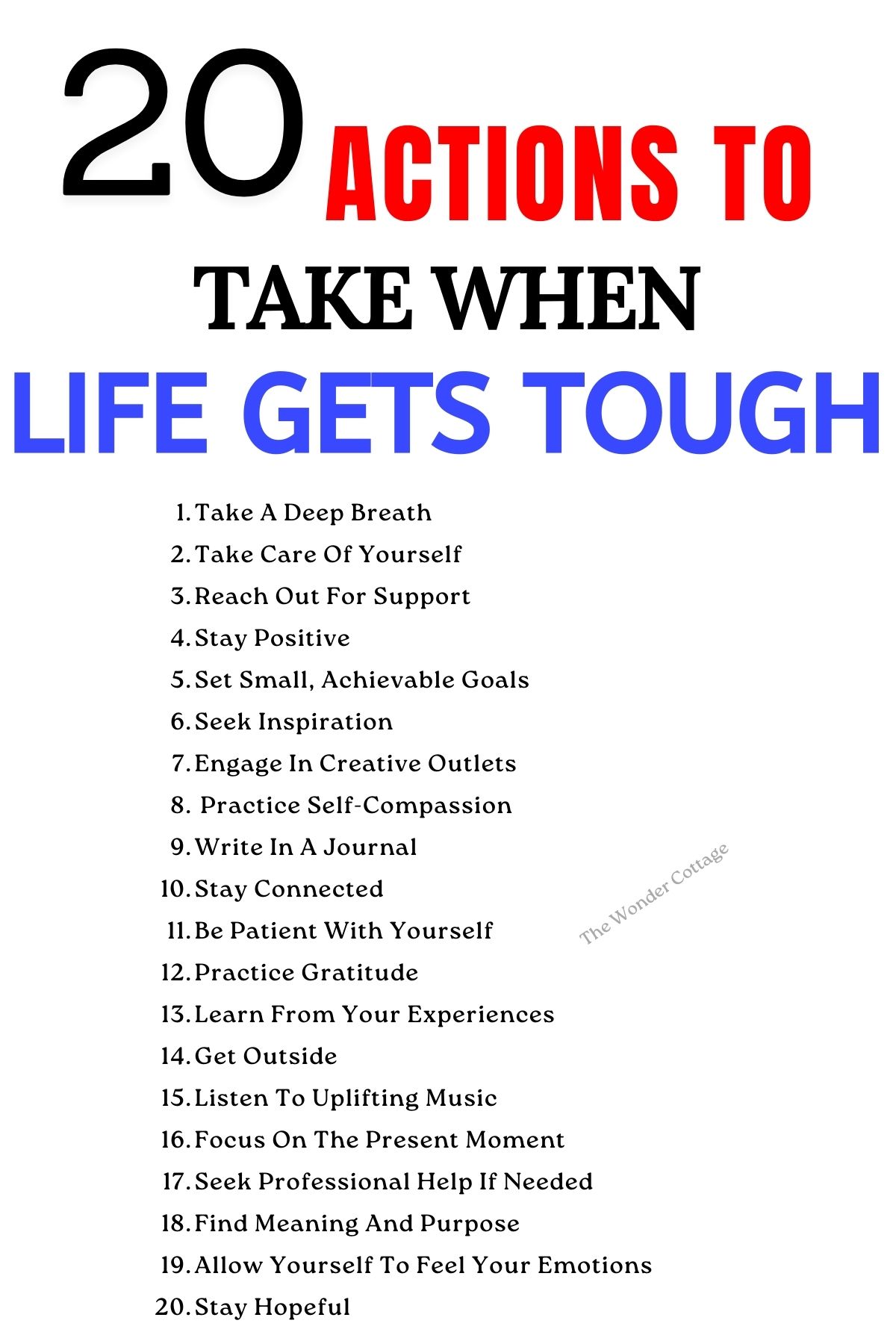Life is unpredictable and can often throw unexpected challenges our way. It may be due to personal challenges, relationship issues, career setbacks, or other unforeseen circumstances. Whatever the reason, it’s important to remember that you are not alone and there are ways to overcome your lowest point in life.
Sometimes, we may find ourselves at our lowest point, feeling overwhelmed, hopeless, and lost. During these tough times, it’s important to remember that there is always a way out and that things will eventually get better.
In this blog post, I will introduce you to 20 strategies for overcoming your lowest point in life. These strategies are not a one-size-fits-all solution, but rather a collection of ideas that may help you navigate through tough times and come out stronger on the other side.

20 Actions To Take When Life Gets Tough
1. Take A Deep Breath
When life gets tough, one action to take is to take a deep breath. By doing this, you can calm yourself down and regain control of your emotions. Deep breathing can help reduce stress and anxiety, allowing you to think more clearly and make better decisions.
It is a simple and effective way to cope with difficult situations and find a sense of peace amidst the chaos. So, whenever you feel overwhelmed or challenged by life, remember to take a deep breath and take a moment to center yourself.

2. Take Care Of Yourself
When we’re feeling low, it’s easy to neglect our physical and mental health. However, self-care is crucial during these times. Make sure that you’re eating healthily, getting enough sleep, and doing things that you enjoy.
You can do simple things like taking a warm bath, going for a walk in nature, listening to music, exercising, or spending time with loved ones can also help lift your spirits. Taking care of yourself can help you feel more balanced and better able to deal with the challenges life throws at you.
Taking time for yourself and doing things that make you happy can help you feel better. Remind yourself that it’s okay to prioritize your well-being and put yourself first.

3. Reach Out For Support
Reaching out for support means asking others for help when you are struggling or feeling low. This can be talking to friends or family, speaking to a therapist or counselor, or joining a support group.
It’s essential to reach out to someone you trust and talk about your feelings and sharing your emotions can help ease your burden and provide you with much-needed support.
Seeking support can provide you with guidance, comfort, and a listening ear to help you overcome your struggles and get through tough times. Remember, it is okay to ask for help and lean on others for support when you need it.
4. Stay Positive
When you are faced with challenges or difficult situations, it can be easy to feel overwhelmed and hopeless. However, staying positive can help you to shift your perspective and focus on the good things in your life.
Remember, it’s okay to feel down sometimes, but staying positive can help you bounce back and overcome any challenges that come your way.
When you focus on positive thoughts and affirmations, you can shift your mindset from one of defeat and despair to one of hope and optimism. This can help you see your situation in a new light and find the strength to keep going.
5. Set Small, Achievable Goals
Setting small, achievable goals can help you overcome your lowest point in life by giving you a sense of accomplishment and progress. When you are feeling low, it can be difficult to see the bigger picture and feel overwhelmed by the challenges you are facing.
By setting small goals, you can break down your larger problems into manageable tasks that are less daunting and allow you to focus on making progress in small steps. This approach can also help you stay motivated and positive as you see yourself making progress, no matter how slow or small it may seem.
By achieving these small goals, you can boost your self-confidence and motivation to tackle larger challenges. Celebrate each small victory and use them as stepping stones to overcome your lowest point in life. Remember, progress is progress no matter how small, and every step forward is a step toward a brighter future.

6. Seek Inspiration
Seeking inspiration can help you overcome your lowest point in life by finding motivation and strength to keep going. You can seek inspiration from positive people, uplifting quotes, or successful stories of others who have overcome challenges.
By surrounding yourself with positivity and motivation, you can start to see a way out of your lowest point and begin to believe in yourself again. Remember, you are not alone in your struggles, and taking inspiration from others can remind you that you are capable of overcoming anything that comes your way.
7. Engage In Creative Outlets
Engaging in creative outlets can be a helpful strategy for overcoming your lowest point in life because it allows you to express yourself and healthily process your emotions. When you are feeling low, using your creativity can help you focus on something positive and uplifting.
Whether it’s painting, writing, dancing, crafting, or any other form of creative expression, immersing yourself in these activities can provide a sense of purpose and fulfillment. Creating something beautiful or meaningful can also boost your confidence and self-esteem, giving you a sense of accomplishment during difficult times.

8. Practice Self-Compassion
Self-compassion is a way to treat yourself with kindness and understanding when you are going through a tough time. When you are feeling low, it can be easy to be hard on yourself and criticize yourself for not being good enough.
However, practicing self-compassion means being gentle and forgiving towards yourself, just like you would treat a friend who is struggling. This can help you overcome your lowest point in life by building your self-esteem and resilience.

9. Write In A Journal
Writing in a journal can be a helpful strategy for overcoming your lowest point in life because it allows you to express your thoughts and feelings in a safe and private space. By putting your thoughts and feelings down on paper, you can release some of the weight you may be carrying.
You can gain clarity about your situation and process your feelings by writing. Additionally, journaling can provide a sense of control and empowerment during times when everything feels out of your control. You can reflect on your past experiences, and track your progress. This can create a sense of purpose and direction, giving you something to focus on during tough times.
10. Stay Connected
Stay connected means to keep in touch with people who care about you, like friends and family. When you are going through a tough time, it can be easy to isolate yourself and feel alone. But staying connected can help you feel supported and less alone.
By staying connected, you can talk to someone about your feelings and receive encouragement and guidance. You can also get practical help and resources that can make a difference in your situation.
Being around people who care about you can help boost your mood and provide a sense of belonging. It is important to remember that you are not alone and that there are people who care about you and want to help.
Related Posts
11. Be Patient With Yourself
This means allowing yourself time to grow, learn, and improve without being too hard on yourself for mistakes or setbacks. It’s about understanding that progress takes time and embracing a mindset of self-acceptance and understanding.
When you are at your lowest point in life, it can be easy to get frustrated and want to give up. But by practicing patience with yourself, you are allowing yourself to work through your struggles at your own pace.
Being patient with yourself can also help you build resilience and perseverance. It can give you the strength and determination to keep going, even when things seem tough. By taking things one step at a time and not rushing the process, you can make steady progress toward overcoming your lowest point in life.

12. Practice Gratitude
Practice gratitude means to think about and be thankful for the good things in your life. It can help you see that even in your lowest point, there are things to be grateful for. When you focus on the positive aspects of your life, it can shift your perspective and help you to overcome difficult times.
Being grateful can also bring a sense of peace and contentment, which can help you cope with challenges. It is a simple but powerful strategy that can help you navigate through tough times and come out stronger on the other side.
13. Learn From Your Experiences
Learning from your experiences means taking the lessons from your past mistakes or challenges and using them to improve and grow. By reviewing what went wrong, identifying patterns and mistakes, and understanding how you can avoid similar situations in the future, you can develop new skills and insights that will help you overcome obstacles and move forward.
This approach can help you build resilience, gain a greater sense of self-awareness, and ultimately become better equipped to handle life’s challenges. By reflecting on past experiences, you can see how you have overcome difficulties in the past and use those strategies to navigate your current situation.
14. Get Outside
Getting outside can serve as a simple yet powerful tool for shifting your mindset and finding a renewed sense of hope and optimism during challenging times. When you step outside, you can connect with nature, which can have a calming and grounding effect on your emotions.
The physical act of moving your body and being in the fresh air can also boost your mood and energy levels. Being outside allows you to engage in activities that bring you joy or relaxation, such as jogging, yoga, hiking, picnicking or simply enjoying the beauty of the natural world.
By immersing yourself in the outdoor environment, you can temporarily escape from your troubles and gain a sense of peace and clarity. So, next time you’re feeling down, try stepping outside and immersing yourself in the beauty of the natural world.

15. Listen To Uplifting Music
Listening to uplifting music can help you feel better when you’re going through a tough time. When you’re feeling low, music can have a powerful effect on your mood and emotions. Uplifting music has positive lyrics and melodies that can lift your spirits and make you feel more hopeful.
When you listen to uplifting music, it can distract you from negative thoughts and feelings, and help you focus on more positive things. It can also give you a sense of comfort and support like you’re not alone in what you’re going through.
So, when you’re feeling low, try listening to some uplifting songs. It might just help you feel a little bit better and give you the strength to keep going.
16. Focus On The Present Moment
Focus on the present moment means paying close attention to what is happening right now, without worrying about the past or future. This can be a helpful strategy for overcoming your lowest point in life because it allows you to let go of negative thoughts and emotions.
By focusing on the present moment, you can better appreciate the good things in your life and find moments of peace and clarity. Practicing mindfulness and staying present can help you build resilience and cope with difficult situations.
It can also remind you that although you may be going through a tough time now, it is temporary and things can get better. By focusing on the present moment, you can find moments of peace and strength to carry you through your lowest point in life.

17. Seek Professional Help If Needed
If you’re struggling with severe depression, anxiety, or thoughts of self-harm, don’t hesitate to seek professional help. A therapist or counselor can provide you with the support and resources you need to overcome your challenges and heal from your pain.
It’s necessary to keep in mind that seeking assistance is a show of strength rather than weakness. Professionals are trained to help individuals cope with their struggles and develop effective coping strategies. They can offer a safe space to talk about your feelings, provide tools to manage stress and anxiety and offer tailored treatment options, such as therapy or medication, if necessary.
By seeking professional help, you are taking an active step toward improving your mental health and well-being. Remember, you don’t have to face your lowest point alone – there is support available to help you through it. Don’t hesitate to reach out for help when you need it.
18. Find Meaning And Purpose
Take notice of the things that provide your life with meaning and direction. Engaging in activities that align with your values can help provide a sense of direction and fulfillment. Consider what brings you joy and fulfillment, and how you can incorporate more of those things into your life.
Be open to trying new things and exploring new opportunities that could bring meaning to your life. This could involve volunteering for a cause you care about, learning new skills, or pursuing a passion project.
Finding meaning and purpose is a personal journey, and it may take time to uncover what truly matters to you. Stay kind to yourself throughout the process, and trust that by finding purpose, you can overcome your lowest point and create a more fulfilling and meaningful life.
19. Allow Yourself To Feel Your Emotions
It is normal to feel sad, angry, frustrated, or any other negative emotion when you are at your lowest point. Allow yourself to feel these emotions and acknowledge them, rather than bottling them up.
By recognizing and accepting your feelings, you can start to process and eventually move past them. This can ultimately help you overcome your lowest point and start finding peace and clarity in your life. So, allow yourself to feel your emotions without judgment

20. Stay Hopeful
Stay Hopeful means to keep believing that things will get better, even when you are going through a really hard time in your life. When you are at your lowest point, it can feel like there is no way out and like things will never get better. But by staying hopeful, you are choosing to focus on the possibility that good things are still possible in the future.
Being hopeful can help you have a more positive attitude, which can make it easier to keep going and not give up. It can give you the strength to get through tough times and persevere, even when things seem impossible.
By staying hopeful, you are choosing to believe that there is still a chance for things to improve, and that can be a powerful motivator to keep moving forward. So, even when things seem dark and difficult, try to hold on to hope and believe that better days are ahead.
Conclusion
Facing our lowest point in life can be a challenging experience, but it is important to remember that we have the strength and resilience within us to overcome it. By implementing the 20 strategies discussed in this guide, we can gradually work towards rebuilding our sense of self and finding hope and strength in our darkest moments. By being proactive and resilient, we can emerge from our lowest point stronger and more determined than ever before.





